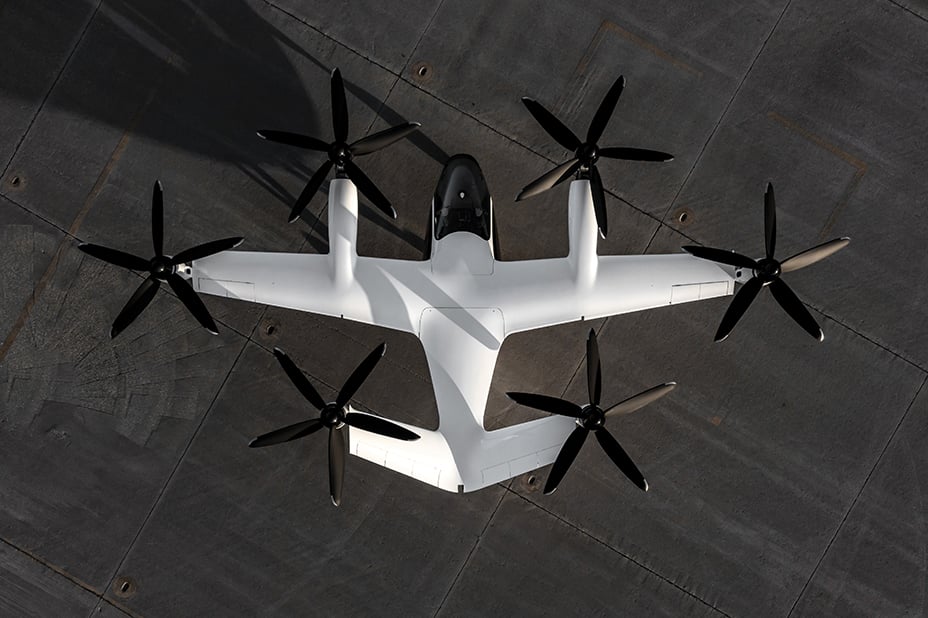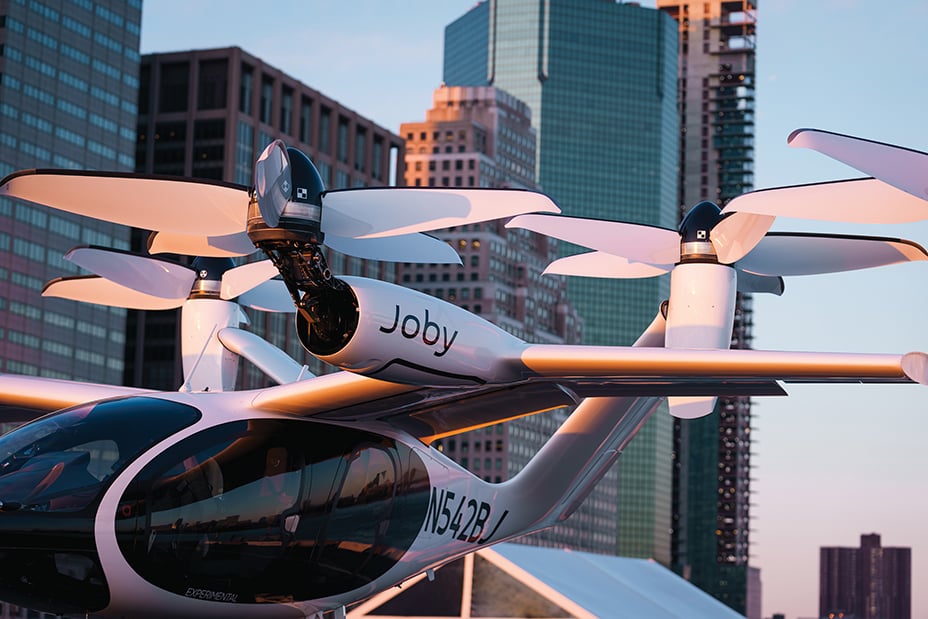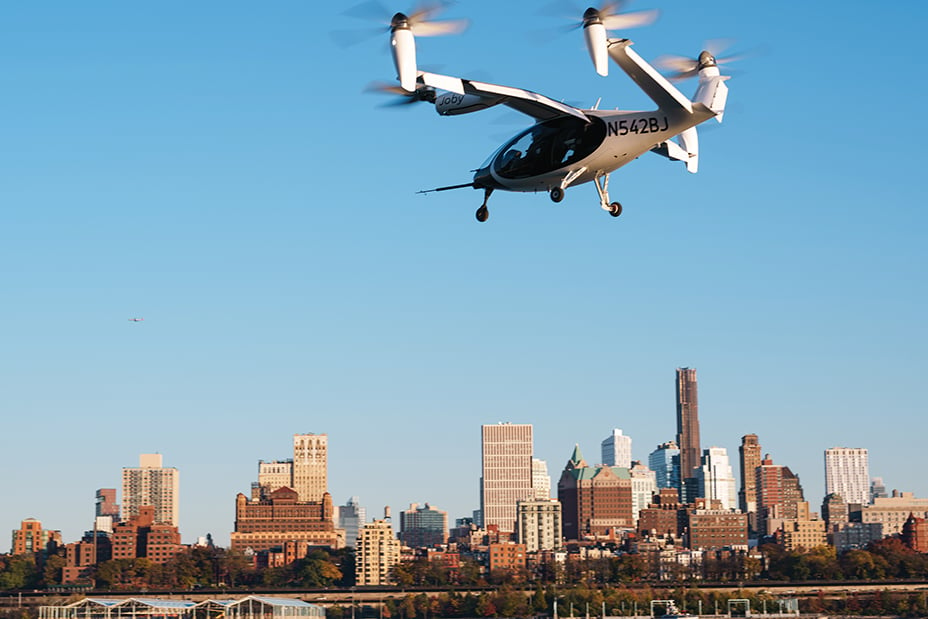Listen to this article
This audio is generated using AI

Joby’s S4 has six motors, powered by four advanced lithium-ion battery packs. Photography courtesy of Joby Aviation.
As with any investment, your capital is at risk.
JoeBen Bevirt grew up in a remote Californian hippie commune called Last Chance in the mountains behind Santa Cruz. Every day the school bus dropped him four miles from home, leaving him to trudge from the Pacific Highway up “an endless hill that made me dream of a better way to get around”.
Many others now share his dream, thanks to Joby Aviation, the flying taxi company he founded in 2009.
Now it envisages “saving a billion people an hour per day” by filling the skies with quick, clean, quiet and safe electric vertical take-off and landing aircraft (eVTOLs, pronounced ee-veetols). Flying without fossil fuel, they can travel 100 miles at up to 200mph.
Joby’s progress in capital raising, aeronautical design, software, manufacturing and assembly, plus its stamina for the grind of regulatory approval, puts Bevirt’s vision within reach. With it comes the possibility of transforming how and where we live.
The eVTOL revolution
EVTOLs promise to cut congestion, reduce emissions and slash journey times. But as with electric cars, the just-about-to-happen period can be prolonged.
Dubai could be the tipping point. Last November, Bevirt and the city-state’s Crown Prince broke ground at Dubai International Airport on the first of four ‘vertiports’ for Joby’s four-passenger eVTOLs, known as S4s. The first paying passenger flights are slated for later this year.
On a good day, a bumper-to-bumper car journey from the airport to the luxury island of Palm Jumeirah takes 45 minutes. Joby is aiming for 12. Other vertiports will be built at Dubai’s Marina and the Downtown shopping area.

Speeding novelty-loving Gulf-dwellers and tourists to the shops may not have featured in Bevirt’s plans when he founded Joby 16 years ago, but Dubai is a chance to prove his firm’s technology and business model.
And as a pre-revenue company, the sooner it generates income, the more control it has over its fate.
Back in the US, Joby awaits approval from the Federal Aviation Administration (FAA). Last autumn the regulator published its long-awaited rulebook for eVTOLs, the first new aircraft category since the helicopter in the 1940s.
Once it gives the green light, Joby can launch the first of its sky taxi services from Los Angeles Airport to downtown LA and from JFK Airport to Manhattan. The latter journey takes 50 minutes by car, seven minutes by Joby.
A distinct team and culture
Joby HQ is a dusty aerodrome at Marina, California, near where Bevirt grew up. This is far off the beaten track for tech investors, who tend to cluster around the San Francisco Bay area.
Colleagues who have visited report on the close camaraderie and a high-fiving, hard-driving culture set by the charismatic founder as he strives to get eVTOLs airborne.
The site houses the firm’s first production line, which Joby built with the help of its manufacturing partner Toyota. It’s a pilot for a planned facility at Dayton, Ohio, where Joby intends to turn out 500 of its S4s with a $500m investment from the Japanese giant.
Baillie Gifford’s research on electric cars helped us understand Joby’s potential to reduce carbon emissions in the highly polluting aviation sector. And it was Tesla’s former chief financial officer, Deepak Ahuja, who introduced us to Bevirt and his executive chairman, Paul Sciarra.
Sciarra is the ideal foil for Bevirt’s engineering genius and critical to Joby’s blend of traditional aeronautical engineering skills and software startup mindset.
As a successful founder in his own right, Sciarra brings operational and management focus to the company. The pair have assembled a leadership team that knows how to operate at scale, can develop training and safety programmes, and is able to ramp up manufacturing.
Unlocking ambitions
As with electric cars, the swing factor for eVTOLs has been batteries becoming lighter, cheaper and more powerful. The S4s distribute the batteries’ power between six propellers.
This removes the need for a heavy central engine and allows the vehicles to keep flying safely if a propeller fails.
Another crucial unlocking factor is noise. Skilful engineering means that a Joby aircraft in flight sounds more like rushing wind than the whump-whump of a helicopter or the whine of a drone.
And without the dangers posed by giant swirling blades just above head height, urban operation becomes feasible.
However, the biggest innovation may not be design or aviation software – a safety-critical field where novelty is unwelcome. Rather, it could be the company’s ‘vertically integrated’ business model: in the footsteps of Tesla and SpaceX, Joby wants to be Boeing-plus-British Airways, so to speak.
Using its proprietary ElevateOS software to help pilots navigate and passengers book, the firm intends to earn revenue from four sources: a rideshare taxi service, selling aircraft to third parties, government contracts and maintenance services.

The scale of this ambition is appealing. In our experience, you need vertical integration to move fast.
Many founder-leaders have taught us that when it comes to new kinds of hardware, controlling every part of the process makes you nimbler than the incumbents and their traditional supply chains.
We’re also impressed by Joby’s early focus on a cost-effective and time-efficient manufacturing process. It’s setting out to create ‘a machine to make machines’ at Dayton.
Not just: how do we get the FAA’s go-ahead? More: how do we get approval for a set of processes that will quickly let us do this at a greater scale?
The sky’s the limit
This ambition is manifest in the quality of talent the company hires and how it approaches the multiple tasks at hand.
We also like the way it engages with regulators and commercial partners, including:
- Toyota: Renowned for efficient, high-quality manufacturing, the carmaker has invested $900m in total. The partnership helps validate Joby’s ability to make highly complex aircraft and parts precisely and reliably.
- Delta Air Lines: The US’s second-biggest airline is working with Joby to help its passengers get to the airport, removing one of the biggest friction points of air travel and hinting at the scale of future opportunities. The two companies also cooperate on safety standards.
- US Air Force: Joby has supplied two non-combat aircraft for logistics, personnel transportation and medical evacuation, with two more on order. The military test process is separate from the FAA’s, though the flying hours it racks up will help achieve civil certification.
Operational excellence and strategic tie-ups are just two of many things Joby needs to get right. But perhaps even more important is its financial planning. Joby has funding partners who understand that they’re there for the long run. It has prioritised a robust balance sheet and not worried about diluting the founders’ shares.
For longer commutes, the S4 could also be the eco-friendly option. An independent study compared the greenhouse gas emissions of a fully loaded eVTOL and an electric car with a typical occupancy of 1.5 passengers. It found the aircraft produced fewer emissions per passenger mile when journeys exceeded 62 miles.
That eVTOL edge could increase if hydrogen power is combined with battery power. Bevirt is now applying his creative energy to the company’s next stage, developing Joby’s potentially more energy-efficient hydrogen-electric SHy4 demonstrator model. It completed a 523-mile test last November, with water as the only by-product.
Ultimately, our investment in Joby rests on the prospect of shareholders benefiting from returns from the transportation revolution it could bring about. With a successful eVTOL business, we would be talking about more than an incremental improvement to the gridlock and pollution blighting people’s lives.
That tallies with our core quest for businesses that can disrupt the world for the better.
Important information
Baillie Gifford & Co and Baillie Gifford & Co Limited are authorised and regulated by the Financial Conduct Authority (FCA). Baillie Gifford & Co Limited is an Authorised Corporate Director of OEICs.
Baillie Gifford Overseas Limited provides investment management and advisory services to non-UK Professional/Institutional clients only. Baillie Gifford Overseas Limited is wholly owned by Baillie Gifford & Co. Baillie Gifford & Co and Baillie Gifford Overseas Limited are authorised and regulated by the FCA in the UK.
Persons resident or domiciled outside the UK should consult with their professional advisers as to whether they require any governmental or other consents in order to enable them to invest, and with their tax advisers for advice relevant to their own particular circumstances.
Financial intermediaries
This communication is suitable for use of financial intermediaries. Financial intermediaries are solely responsible for any further distribution and Baillie Gifford takes no responsibility for the reliance on this document by any other person who did not receive this document directly from Baillie Gifford.
North America
Baillie Gifford International LLC is wholly owned by Baillie Gifford Overseas Limited; it was formed in Delaware in 2005 and is registered with the SEC. It is the legal entity through which Baillie Gifford Overseas Limited provides client service and marketing functions in North America. Baillie Gifford Overseas Limited is registered with the SEC in the United States of America.
The Manager is not resident in Canada, its head office and principal place of business is in Edinburgh, Scotland. Baillie Gifford Overseas Limited is regulated in Canada as a portfolio manager and exempt market dealer with the Ontario Securities Commission (‘OSC’). Its portfolio manager licence is currently passported into Alberta, Quebec, Saskatchewan, Manitoba and Newfoundland & Labrador whereas the exempt market dealer licence is passported across all Canadian provinces and territories. Baillie Gifford International LLC is regulated by the OSC as an exempt market and its licence is passported across all Canadian provinces and territories. Baillie Gifford Investment Management (Europe) Limited (‘BGE’) relies on the International Investment Fund Manager Exemption in the provinces of Ontario and Quebec.

